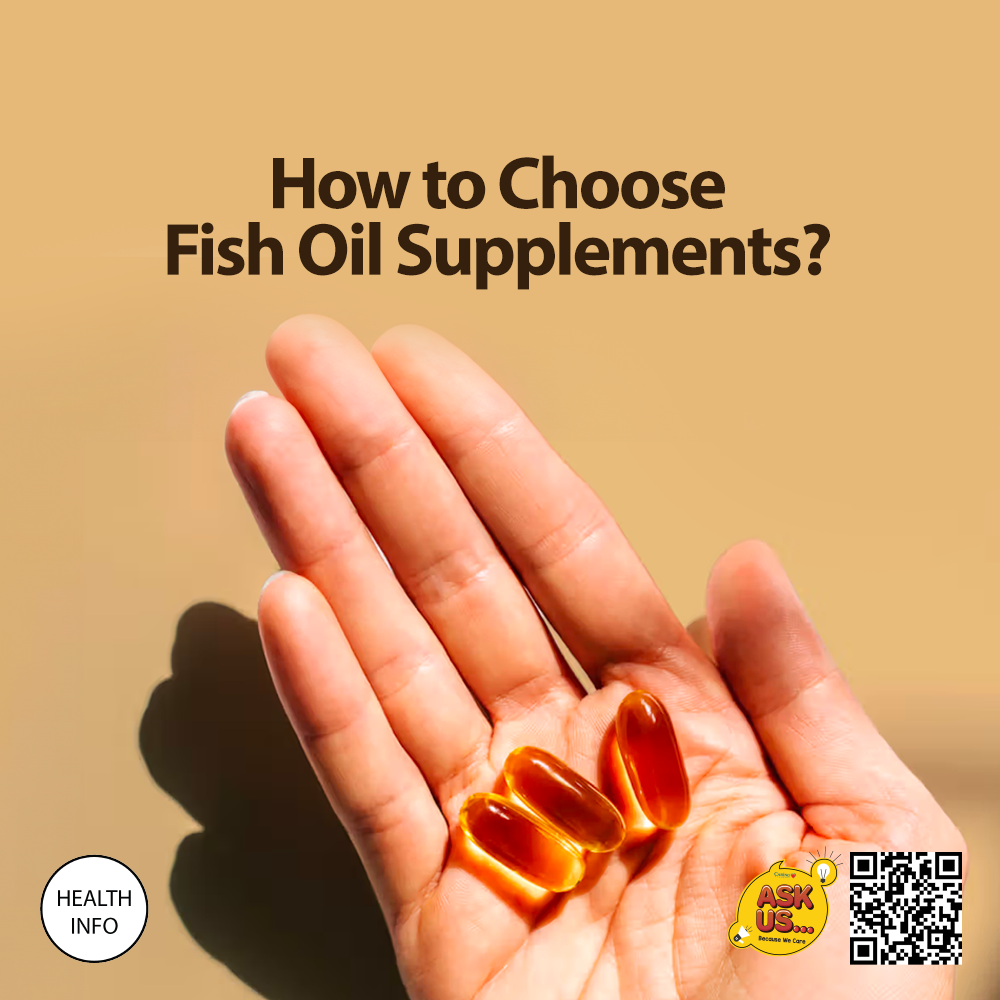- Home
- Health Center
- Health Info
- How To Choose Fish Oil Supplements
How to Choose
How To Choose Fish Oil Supplements


Fish oil serves as a great source of omega-3 fatty acids such as eicosapentaenoic acid (EPA) and docosahexaenoic acid (DHA) which are important to support heart health. Research has shown that omega-3s exert its heart-protecting effect through several mechanisms, including interfering with the aggregation of clot-forming blood platelets, slowing the growth rate of artherosclerotic plaque, reducing triglyceride levels and slightly lowering blood pressure.1 They may also help to support joint, nervous system and eye health.
Omega-3 fatty acids are considered “essential” as our body cannot synthesise them and they must be obtained from diet. For people who do not take omega-3-rich fish like salmon, sardines, mackerel and anchovies regularly or follow a vegetarian diet, fish oil supplement may be an option worth considering. As there is an overwhelming number of fish oil supplements to choose from, let us guide you through everything you need to know about fish oil to help you make your decision.
Decoding the label
The dosing of fish oil is based on the omega-3 content of the fish oil. Therefore, it is the important number to look for on a fish oil supplement label is the actual omega-3 content expressed in milligrams of EPA and DHA, which are the “active ingredient”. The concentrations of EPA and DHA vary in different products, depending on the amount of other ingredients included in the product and how the fish oil is processed. The amount of total fish oil content per capsule is often written on the front label while the actual omega-3 content can be found in the supplement facts panels or ingredient list.
Knowing the forms of fish oil
Fish oil comes in two different forms which are triglyceride and ethyl ester forms. Natural fish oil comes from the tissue of oily fish, mostly in the form of triglycerides. When fish oil is processed to purify or concentrate them, they are transformed into ethyl ester forms which are not found naturally. Purification process gets rid of contaminants such as mercury, lead and other sea pollutants while concentrating the fish oil could increase the EPA and DHA levels. Studies show that the absorption of fish oil is better in the natural triglyceride form than ethyl ester form and processed fish oil is more vulnerable to oxidation.2 Nevertheless, some manufacturers process the fish oil further to convert it back to synthetic triglyceride form for better absorption.
Formulation
Fish oils are commonly found in capsules or softgels in order to mask the foul smell of fish oil and make it easy to swallow. They can be made from bovine gelatin, fish gelatin or vegetable-based ingredients. Marine-based softgels and vegetable capsules would be good options for people who cannot consume bovine gelatin for religious, cultural or dietary reasons. On top of that, some manufacturers use enteric coating to reduce fishy burps and increase the absorption of omega-3 fatty acids by protecting the fish oil softgels from being dissolved until it reaches the small intestine where it is absorbed.
Purity
The presence of toxic chemicals like heavy metals, polychlorinated biphenyls (PCBs) and dioxins accumulated in fish due to marine pollution raised concerns in many people when it comes to buying fish oil products. This may seem like an unnecessary concern as fish oils are made through a process called molecular distillation to remove the toxins from oil to levels that are within the safety limit.3 On top of that, it may be wise to look for fish oil supplements extracted from small fish that are lower on the food chain such as sardines and anchovies as these fish naturally have a lower concentration of contaminants.
Right dosage
The amount of fish oil one should take daily varies depending on the goal of supplementation. The United States Food and Drug Administration (FDA) has established that up to 3g of omega-3 fatty acids daily is considered safe for adults.4 The American Heart Association (AHA) recommends that patients with coronary heart disease should consume 1g of EPA and DHA combined daily for secondary prevention of cardiovascular events.5 Daily intake of 3-4g EPA and DHA may help to reduce elevated triglyceride levels in your blood, which is a risk factor for heart attack.6 Omega-3 fatty acids also show a modest effect on blood pressure lowering when consumed at least 2g/day.7 Besides supporting heart health, at least 2.7g daily consumption of omega-3s may be beneficial in reducing the symptoms in rheumatoid arthritis such as joint pain, swelling and morning stiffness.8
There is no conclusive recommendation for amount of fish oil for supporting mental health. Emerging evidence shows that daily supplementation of omega-3s would be beneficial for improving depressive symptoms and supporting cognitive function in older adults.9-11 The World Health Organisation recommends that pregnant and breastfeeding women should take 300mg omega-3 fatty acids per day of which at least 200mg should be DHA to support the development of foetal brain and eyes.12 Around 1g of omega-3s may help to reduce the risk of age-related macular degeneration (AMD) and improve dry eye symptoms.13
Reference:
- Fish oil and omega-3 fatty acids in cardiovascular disease: do they really work?.Kromhout D, Yasuda S, Geleijnse JM, Shimokawa H (2012). Eur Heart J.
- Omega-3 long chain fatty acid “bioavailability’: a review of evidence and methodological considereations,
- Fish oil: what the prescriber needs to know. Leslie GC, Michael JJ, Susanna MP (2006). Arthritis Research & Therapy.
- Substances affirmed as generally recognized as safe: menhaden oil.Department of Health and Human Services, US Food and Drug Administration. (Web accessed July 2019). Available at: http://frwebgate.access.gpo.gov/cgi-bin/getdoc.cgi?dbname=1997_register&docid=fr05jn97-5.
- Omega-3 polyunsaturated fatty acid (fish oil) supplementation and the prevention of clinical cardiovascular disease. David SS, Thomas AB, Amanda MF et al (2017). Circulation,
- Dose-response effects of omega-3 fatty acids on triglycerides, inflammation, and endothelial function in healthy persons with moderate hypertriglyceridemia. Skulas-Ray AC, Kris-Etherton PM, Harris WS et al (2011). The American Journal of Clinical Nutrition.
- Blood pressure response to fish oil supplementation: metaregression analysis of randomized trials. Geleijnse JM, Giltay EJ, Grobbee DE et al (2002). Journal of Hypertension.
- Omega-3 polyunsaturated fatty acids and the treatment of rheumatoid arthritis: a meta-analysis. Lee YH, Bae SC, Song GG (2012), Archives of Medical Research,
- Effects of n-3 fatty acids, EPA v. DHA, on depressive symptoms, quality of life, memory and executive function in older adults with mild cognitive impairment: a 6-month randomised controlled trial. Sinn N, Milte CM, Street SJ et al (2012). The British Journal of Nutrition.
- Adjunctive Nutraceuticals for Depression: A Systematic Review and Meta-Analyses. Sarris J, Murphy J, Mischoulon D et al (2016). The American Journal of Psychiatry.
- Beneficial effects of docosahexaenoic acid on cognition in age-related cognitive decline. Yurko-Mauro K, McCarthy D, Rom D et al (2010). Alzheimer’s & dementia: the journal of the Alzheimer’s Association.
- Interim Summary of Conclusions and Dietary Recommendations on Total Fat & Fatty Acids. Joint Food and Agriculture Organisation/World Health Organisation Expert Consultation on Fats and Fatty Acids in Human Nutrition (2008).
- The relationship of dietary lipid intake and age-related macular degeneration in a case-control study: AREDS Report No. 20. SanGiovanni JP, Chew EY, Clemons TE et al (2007). Archives of ophthalmology.
- Effectiveness and tolerability of dietary supplementation with a combination of omega-3 polyunsaturated fatty acids and antioxidants in the treatment of dry eye symptoms: results of a prospective study. Olenik A (2014). Clinical ophthalmology.
Latest Health Info
Healthy Weight, Happy Joints
How Does Weight Affect Knee Health? The Link Between Pounds And Pain Osteoarthritis (OA) involves the degeneration of joints, which ...
The Gut Warriors: Prebiotics, Probiotics and Postbiotics
When it comes to gut health, you’ve probably heard of prebiotics and probiotics. But did you know there’s also ...
Tip Moreh: Masa Berbuka Puasa
Moreh adalah tradisi unik yang biasanya diadakan selepas solat tarawih pada bulan Ramadan. Ia melibatkan penyediaan dan perkongsian makanan ringan ...



